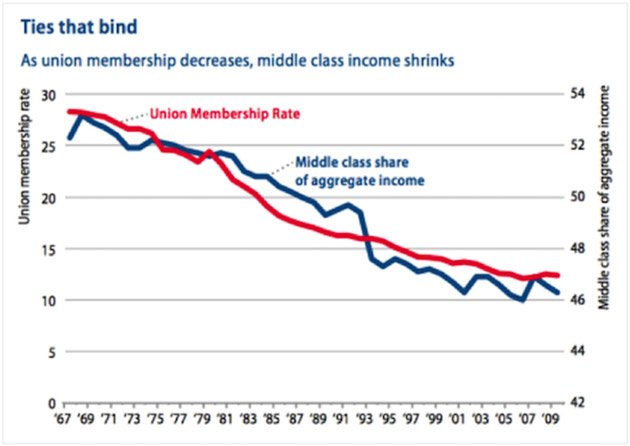First off I would just like to say fuck his digital signature. Now that we've got that out of the way: Capitalism didn't suddenly spring forth as an inauguration gift to Eisenhower. Almost all of the graphs are from 1950-ish onward. Wind the clock back farther, and 1950 looks less benchmarky and more outliery.(pdf warning). There's a rant that could go here that sounds a bit like: something something nlrb something something wildcat something something something West Virginia.Our leading indicator for wages normally provides a 15 month advanced warning of changes in wages. It is pretty good and all the ingredients are the same ones that have accurately worked for decades, yet the relationship has broken down.
There is an extremely high correlation historically between the index of the number of strikes in the US with the wage growth of workers. Today, strikes are extremely rare, and this in part explains why wages are so low.
Mauldin is one of the milder "subscribe to my newsletter" Republicans. He's usually all about deficits and debts and the Fed. I would say I share his perspective less than half the time but I'm usually thankful to have it. The fact that he linked to something from his cowriter that sounds like a Jacobin article is noteworthy in and of itself. That he's halfway to Piketty is pretty astounding considering how scathingly dismissive his whole posse was when it came out (half of his first book is Reinhart and Rogoff).
It's surprising that tax law isn't mentioned here. I can't imagine that our tax landscape doesn't directly affect how corporations decide to divvy up their revenues. As St. Milton liked to point out, if you want more of something, tax it less, and if you want less of something, tax it more. Well, payroll taxes have increased, and corporate taxes have decreased starting with, I don't know, Ronald Reagan (or exactly when productivity and wages lose their correlation). The new corporate tax law will accelerate this behavior, because it does nothing to incentivize companies to pay people more, and does a lot to incentivize them to buy back stocks and pay dividends. Monopolization may be the proximate player here, but I don't think you'd see so many M&A's if our tax system didn't encourage that behavior, also.

